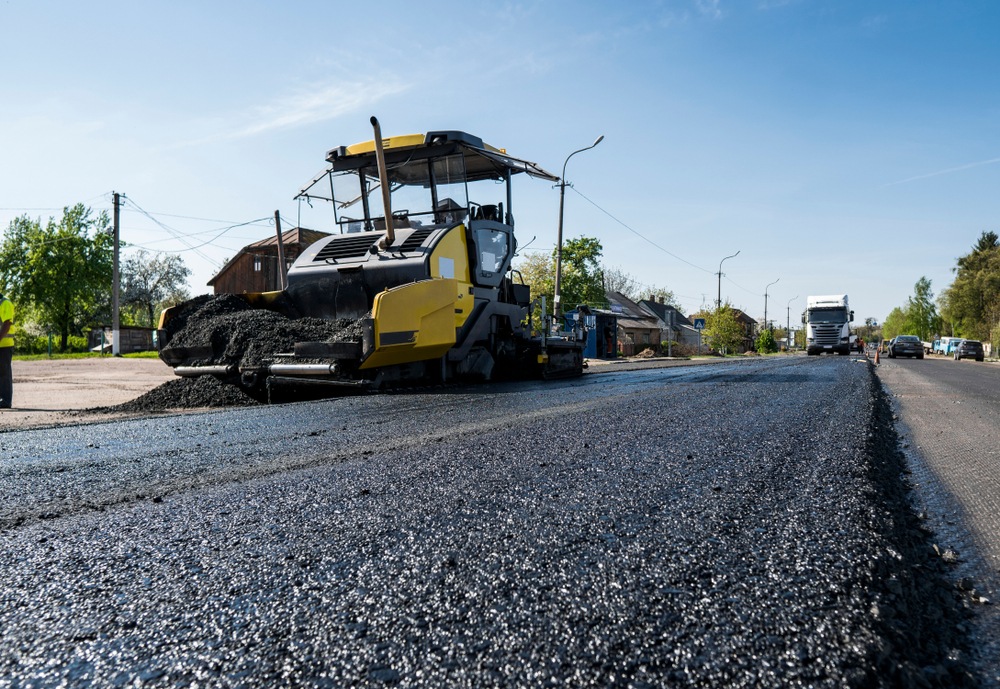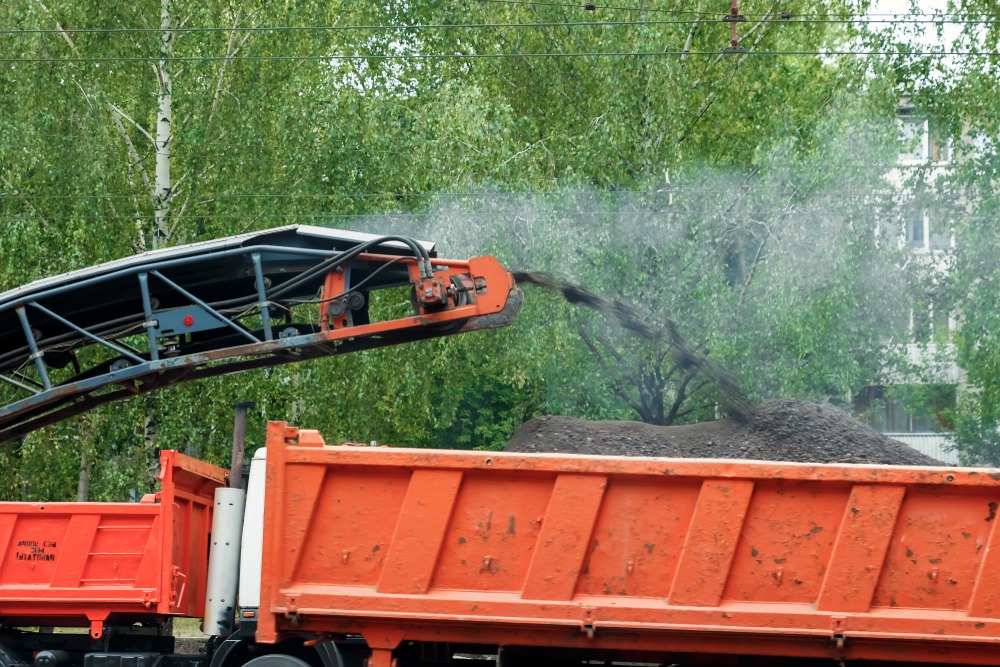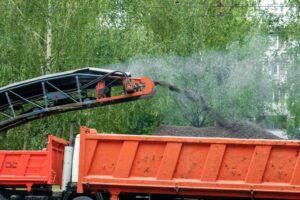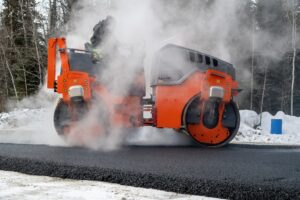Table of Contents
Asphalt is the most commonly used material on our roads,, parking lots, and walking paths. Despite its popularity, most people never stop to think about what asphalt is made of or why the quality of those materials matters.
If you’re planning a paving project, whether it’s for a busy commercial lot or community walking path, knowing what goes into asphalt can make a big difference.
The right combination of well-sourced aggregates and a durable binder has a significant impact on more than just the surface’s appearance. High-quality asphalt determines how long your pavement lasts, how well it stands up to traffic and weather, and how much you’ll spend on repairs down the line.
In this article, we’ll walk through what asphalt is made of, the different types of mixes, when and how it should be installed, and why using quality materials from the start is key to getting the best results for your property.
The Basic Ingredients of Asphalt
Ever wonder what asphalt is made of? At its core, asphalt is a carefully designed mix of just two main ingredients: aggregates and a binder.
- Aggregates: These are crushed stone, gravel, sand, and other mineral materials. They make up the bulk of the mix and give asphalt its strength, structure, and durability.
- Binder: This is usually a petroleum-based substance called bitumen, a sticky, black material that coats the aggregates, holding them together while providing flexibility and water resistance.
These asphalt components are heated, mixed, and then spread and compacted to form the smooth surfaces you see on roads, driveways, and parking lots.
However, the quality and proportion of the asphalt mix greatly impact its performance. If the aggregates are too soft or dirty, or if the binder isn’t properly refined, the asphalt can become brittle, crack easily, or wear out faster than it should. High-quality materials result in longer-lasting pavement that withstands traffic wear and harsh weather conditions, saving you time and money on future repairs.
How Asphalt Is Manufactured
The manufacturing process of asphalt involves a highly controlled process of combining aggregates with a binder to ensure a consistent, quality product.
Here’s the typical process of how asphalt is made:
- Material Selection: High-quality aggregates are chosen based on size, shape, and composition to meet the requirements of the asphalt mixture.
- Heating: Aggregates are heated in a rotary dryer to remove moisture and prepare them for mixing.
- Mixing: The hot, dry aggregates are blended with bitumen in an asphalt mixing drum.
- Storage: The finished mix is temporarily stored in insulated silos to maintain temperature before being transported.
- Transport: Trucks deliver the hot mix to the paving site, where it’s laid, compacted, and cooled.
This process may vary slightly depending on the type of mix and scale of the project. Still, proper temperature control, ingredient ratios, and timing are always critical to ensuring durable pavement.

Types of Asphalt Mixes and Their Applications
Not all asphalt is made of the same asphalt components. Different project needs and environmental conditions call for different asphalt formulations. These variations are known as asphalt mixes and are designed to optimize performance, flexibility, and longevity depending on how and where the pavement will be used.
At Sipes Asphalt & Concrete, the team selects the right mix based on specific project goals, traffic patterns, temperature ranges, and surface demands for all our asphalt paving services.
Here’s a breakdown of the most common asphalt mixes:
Hot Mix Asphalt (HMA)
Hot mix asphalt is the most commonly used asphalt in road construction. It is produced at high temperatures (between 300-350°F) to ensure a proper and strong bond between aggregates and bitumen, and is offered in several subtypes with custom advantages.
- Benefits: Durable and weather-resistant.
- Best For: highways, heavy-use parking lots, and driveways.
Porous Asphalt
Designed to allow water to drain through its surface, porous asphalt is a sustainable option for managing stormwater runoff. It permits water to drain through the asphalt surface into a special aggregate compound base, where it eventually filters into the soil below.
- Benefits: Reduces puddling, improves traction, and supports groundwater recharge.
- Best For: Eco-friendly projects or areas with water drainage concerns.
Stone Matrix Asphalt (SMA)
Stone matrix asphalt mix features a higher concentration of crushed stone, providing enhanced durability and resistance to rutting. Its higher concentration of aggregates makes it sustainable under heavier loads and traffic.
- Benefits: Offers superior strength and skid resistance.
- Best For: High-traffic roads and areas prone to heavy loads.
Dense-Graded Mix
Dense-graded mixes are well-balanced blends of fine and coarse aggregates. They offer versatility and are used in both surface and base layers.
- Benefits: Strong, compact, and weather-resistant.
- Best For: Most general-purpose paving projects.
Warm Mix Asphalt
Produced at lower temperatures than hot mix, warm mix asphalt reduces emissions and allows for longer transport and lay-down times.
- Best For: Cooler weather asphalt installations.
- Benefits: Eco-friendlier production with comparable performance to hot-mix asphalt.
Cold Mix Asphalt
This mix is typically used for temporary repairs or in areas with low traffic. It’s easy to work with and doesn’t require high heat.
- Best For: Pothole repairs and off-season patching.
- Benefits: Transportable and sustainable.
Ready to Plan Your Asphalt Project?
Why the Quality of Asphalt Materials Matters
The durability and safety of any asphalt surface depend on the quality of the material. If the mix is made with low-grade aggregates or poorly refined bitumen, the pavement may:
- Develop cracks or deteriorate quickly.
- Absorb excess moisture, leading to potholes or frost damage.
- Require more frequent patching or sealing.
Lower-quality asphalt may seem cost-effective upfront, but it almost always results in higher maintenance costs and a shorter lifespan. Choosing the right asphalt components from the start delivers smoother finishes, fewer repairs, and long-term savings.
At Sipes Asphalt & Concrete, high-grade materials and precise mix designs are standard. We purchase asphalt from plants that use premium binders and properly sized aggregates to ensure each project stands the test of time.
Asphalt Material Testing & Quality Assurance
Before asphalt is installed, it undergoes rigorous testing to ensure it meets performance standards for strength, flexibility, and moisture resistance.
Key quality checks include:
- Aggregate Testing – Assesses size, gradation, cleanliness, and moisture.
- Binder Evaluation – Tests bitumen for viscosity and temperature tolerance.
- Mix Design Approval – Creates and tests a custom mix based on traffic, climate, and subgrade conditions.
These procedures for asphalt material testing and quality assurance ensure a consistent quality, smoother installation, and long-lasting results.
The Role of Temperature in Asphalt Installation
Temperature control is one of the most critical and often overlooked factors in asphalt performance. If the mix cools too quickly or is applied outside the recommended range, it won’t bond or compact properly. This can lead to early cracking, poor density, and reduced structural integrity.
Here’s how temperature affects asphalt installation:
- Production – The mix must be manufactured at the correct temperature based on the type of asphalt.
- Transport – Insulated trucks maintain the mix’s temperature during delivery to prevent premature cooling.
- Application – Surface and ambient temperatures must be within spec before paving begins.
- Compaction – Asphalt must be rolled and compacted before it cools below workable temperatures.
Poor temperature management during installation can create weak spots that require early repairs. While infrared asphalt repairs can fix these issues, they’re best prevented with proper installation from the start.
Superior Results Through Advanced Equipment and Trusted Materials
The longevity of an asphalt surface starts well before any material hits the ground. It begins with a deep understanding of what asphalt is made of—a carefully balanced mix of aggregate and bitumen tailored to your surface needs, climate conditions, and expected traffic load.
But materials alone aren’t enough. It takes an experienced asphalt contractor with years of local expertise in paving installations and repairs to provide paved surfaces that last.
At Sipes Asphalt & Concrete, high-quality materials from trusted suppliers combined with our advanced paving equipment and digital grading tools ensure we deliver the best possible paving project to our customers. From sub-base preparation to final compaction, every step is managed with care and precision.
Whether it’s a commercial lot or municipal roadway, our team provides asphalt solutions engineered to perform, season after season.
What To Expect When You Work With Sipes Asphalt & Concrete
At Sipes Asphalt & Concrete, we make it a priority to keep your project running smoothly, from first contact to final walkthrough. Our process is built on clear communication, expert planning, and dependable results.
Here’s how we work:
1. On-Site Consultation
A dedicated project manager meets with you to assess the site, discuss your goals, and recommend the best approach for your needs and budget.
2. Detailed Planning
You’ll receive a clear, straightforward plan outlining the timeline, scope of work, materials, and equipment, so there are no surprises.
3. Efficient Scheduling & Execution
We coordinate work around your schedule and complete the job with minimal disruption using professional crews and reliable equipment.
4. Final Review & Sign-Off
Before we wrap up, every detail is inspected and approved to ensure the work meets our standards, and yours.
Let’s Talk About Your Asphalt Project—Contact Sipes Asphalt & Concrete Today
If you’re planning a new asphalt installation or need repairs to restore a damaged surface, the materials you choose and the team behind them matter.
At Sipes Asphalt & Concrete, every job is handled with care, precision, and a commitment to long-term value. Whether it’s a community walking path or a large commercial lot, our team takes the time to understand your needs and deliver custom solutions that stand up to wear, weather, and time. Request a Free Quote.
Frequently Asked Questions About Asphalt Materials and Performance
1) How does climate affect the performance of asphalt?
Temperature swings, heavy rainfall, and freeze-thaw cycles all impact asphalt. In colder regions, asphalt is more prone to cracking due to thermal contraction and ice expansion. Warm mix asphalt or mixes with added flexibility are often used in these areas to increase durability.
2) Can recycled materials be used in asphalt?
Yes. Many asphalt mixes include Reclaimed Asphalt Pavement (RAP), which recycles milled asphalt from old surfaces. When processed correctly, recycled asphalt can reduce material costs and environmental impact without sacrificing quality.
3) What role does proper installation play in asphalt quality?
Even the best materials will fail if the installation process is rushed or done improperly. Correct compaction, temperature management, and grading are essential for long-term performance. We use modern equipment and skilled crews to ensure every step is executed with precision.
4) How often should asphalt be maintained to preserve its quality?
Most asphalt surfaces benefit from maintenance every 3–5 years, including crack sealing, sealcoating, and pothole repair. This helps prevent moisture intrusion, oxidation, and surface wear.
5) Are there industry standards for asphalt materials?
Yes. Asphalt mix designs are typically required to meet established industry standards, ensuring an optimal balance of stability, flexibility, and durability. These standards cover key factors such as aggregate gradation, binder content, and appropriate temperature ranges.




